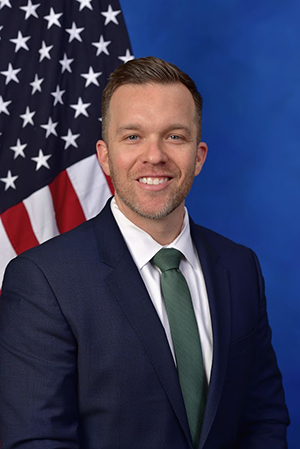
If the name Dustin Sternbeck, rings a bell, maybe it’s a siren.
Sternbeck serves as director of communications for the Metropolitan Police Department (MPD) of the District of Columbia, and as such he is often the voice you hear on the radio or the face you see on TV when high-profile police activity in Washington makes the news.
The MPD is the nation’s sixth-largest police department, with some 4,500 sworn and civilian employees. You can imagine he stays busy.
“That’s the understatement of the year,” said Sternbeck, a 2010 Schar School of Policy and Government graduate who joined the MPD six years ago after holding a similar position in Arlington County. “They warned me when I was interviewing that it's hard to imagine the pace and volume, but man, were they right.”
His job additionally entails serving as communications co-chair for high security events—the Presidential Inauguration, for instance. The position has Sternbeck putting out fire after figurative fire just about each day in a city that has seen a noticeable uptick in crime in the last several years.
It wasn’t that long ago the 41-year-old Sternbeck was putting out fires of a different sort, as a fireman and a public information officer in the Loudoun County Department of Fire, Rescue, and Emergency Management. He worked there when he started pursuing his Master’s in Public Administration degree in the Schar School’s Northern Virginia Public Service Fellows Program in 2010.
Participants in the highly ranked Northern Virginia Public Service Fellows Program—in which the students study and work together toward creating policy to solve a real-life problem—are nominated by their employers and their tuition is paid in full or in part by the agency.
“It was great to just have the opportunity to work alongside and learn from industry experts and from the professors, but also from my classmates,” Sternbeck said of the program. During the course he and the others were exposed to “every facet of local government, so you develop an appreciation for jobs that aren't necessarily within my day-to-day responsibilities.”
The MPA degree prepared the Northern Virginia native with a familiarity and understanding of government hierarchy, budgeting, and “all the different pieces of the puzzle and how they really fit together so that we all ultimately can do what we got into the business for—to serve our communities.”
Sternbeck said he applies some aspect of what he learned in the MPA program each day.
“I owe a lot to that program and I always encourage people to explore options if they're interested in public administration to check that one,” he said. “It’s hard to imagine that there are other better programs in the country.”
